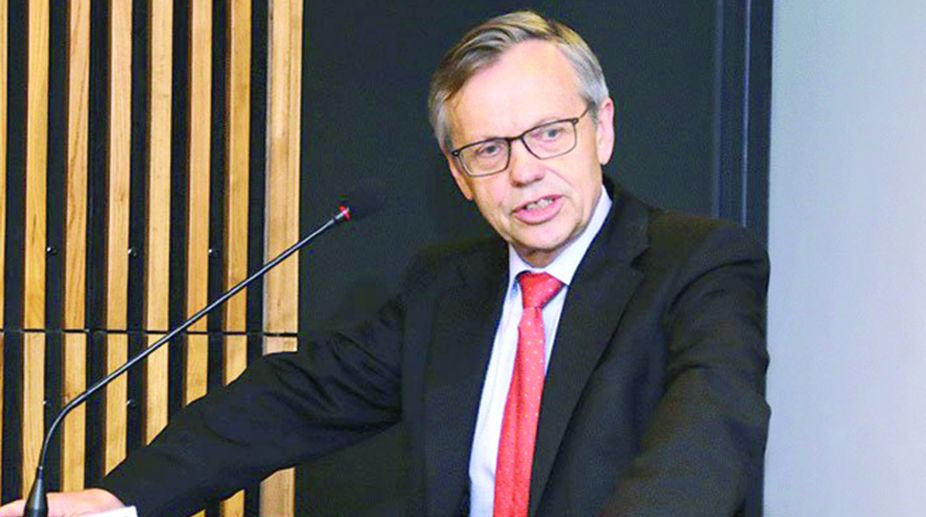The year was 2015, when Nils Ragnar Kamsvåg took charge as the Norwegian Ambassador to India. Since then, the ambassador has been taking various initiatives to strengthen India-Norway relationship. This is not his first stint as an ambassador. Nils Ragnar Kamsvåg served in Serbia, Macedonia and Montenegro, Royal Norwegian Embassy and Belgrade before coming to India. With a Masters in History, Ambassador Kamsvåg, has also worked in various positions, including Project Manager, Crisis Management, MFA; Norwegian Representative to the Palestinian Authority, Al Ram; and Ambassador, Middle East and North African Affairs, MFA. In an interview with Rakesh Kumar, Ambassador Kamsvåg spoke about India-Norway relationship and how it can be improved and Norway’s position on India’s bid for permanent UN Security Council membership. Excerpts:
Pollution has been a major issue in Delhi and all over the world. How has Norway successfully tackled the problem?
Advertisement
We have had very strong focus on environment issues. It is from a long time back. In spite of the fact that we are oil exporters, we have the highest gasoline prices in the world. That’s of course meant to kind of discourage people from using much of gasoline. Then we were early in adopting a policy on electric cars. However, in the beginning not much happened as there were very few electric cars to choose from. Now we have started producing more, so people have many choices available. Other than this, we have started giving several incentives. For instance, if one has electric vehicles, he can drive on the bus lane.
When it comes to transport, Norway has one of the best public transport systems in the world. Can you share the secret and suggest how to improve the Indian system?
The first thing I would like to suggest is to have a good public transport. It is not easy for people to shift from these gasoline vehicles to electric vehicles. Even if they switch to electric vehicles, there is another problem. Norway has 100 per cent hydropower; it is clean energy while India uses a lot of coal. Therefore, if you are using electric vehicles, there will be pollution in India.
Given the vast population of India, do you think public transport for all will be feasible in the country?
It is a question of priority and political will. If you have limited resources then it is a question of priority. For instance, in India, pollution is debated every autumn. But to overcome it, one needs a long term policy. You can’t change things in a single day. Take for example, Delhi. When Metro came, it was a big step forward because lots of people could travel in it. Therefore, India should improve public transport.
How do you look at relations between India and Norway?
Our relations are very good. For us India is an important political partner, also it is the biggest democracy in the world. A strong India is very important for Norway and Europe. There are several things going on between India and Norway. For instance, there is a pension firm, which invested more than US $ 10 billion. They are probably one of the biggest single investors. However, still our trade with India is too little. We hope to improve it.
Why are there very little high-level exchanges between India and Norway?
Yes that is… But here we would like to see more. For instance, the President of India visited Norway in the autumn of 2014. Like this we would like to see more high level exchanges of Prime Ministers and Presidents. On both sides, we are working to improve. Other than this there is research cooperation going on between India and Norway. Right now, we have more than 90 joint projects being carried out. It has been an enormous growth.
India and Norway had signed a Statement of Intent (SOI) in the defence field in 2014. Has there been any progress in taking defence cooperation forward?
Yes. We have had exchanges on naval side just last month. We have a big delegation of students and teachers from defence colleges visiting Norway. The most important arms producers are present in India. But these defence procurements are quite time-taking for the country as there are many negotiation. One has to be patient.
Norway is a member of the Nuclear Suppliers’ Group (NSG). Why is India being denied admission to the grouping?
It is quite public that we are not stopping the introduction of India in NSG as a member. We would very much welcome India as a member. This is the negotiation which all the members will have to agree. This is what the actual criteria is. Hopefully we will see India as a member some day.
Does Norway support India’s candidature for a permanent seat on the UN Security Council?
Yes…we support India being in the Security Council.
Why has Norway chosen to remain out of the European Union (EU)?
Well that is always difficult to answer; we had two referendums on it. We are economic members of EU and also a member of Schengen.
In many ways we are very integrated, but we had many debates on it. Farmers’ association protested that after becoming a member, it won’t be possible to do farming in most of Norway because of climate challenges. Second were the fishermen. We are very rich in fisheries and the fishermen community was afraid that if we become a member of the EU, we will open the country’s fisheries to EU. Then there was also a mixture of inferiority and superiority complexes: inferiority, because we are only five million and how can we influence 500 million people; and superiority complex because we have some of the world’s best social welfare systems.











